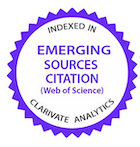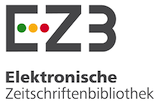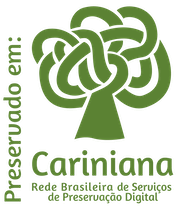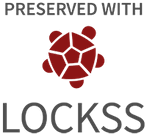Suco das folhas de cactáceas do gênero Pereskia: efeito sobre os parâmetros fisiológicos de ratos Wistar
DOI:
https://doi.org/10.1590/1809-6891v21e-58061Resumo
O objetivo foi avaliar se o suco das folhas de cactáceas de três espécies do gênero Pereskia promove alterações dos parâmetros fisiológicos de ratos Wistar. O estudo foi dividido na etapa 1 (indução da obesidade com dieta hipercalórica, glutamato monossódico e solução de sacarose) e etapa 2 (utilização do suco das cactáceas). Os dados do peso corporal, Índices de Massa Corporal e de Lee, consumo alimentar, massa dos tecidos adiposos e seus Índices de Gordura Visceral e Epididimal foram comparados pelo Teste de Tukey a 5%. O glutamato monossódico e a sacarose em associação com a dieta hipercalórica não aumentaram os tecidos adiposos. Não houve diferença estatística entre as médias do peso corporal, Índice de Massa Corporal e Índice de Lee, peso hepático e o Índice Hepato-Somático. O suco da Pereskia grandifolia promoveu um menor ganho de peso total como resultado do baixo consumo alimentar. O suco da Pereskia aculeata aumentou a massa do tecido adiposo visceral. Concluiu-se que o suco da Pereskia grandifolia apresentou melhor efeito sobre o ganho de peso. Tais cactáceas são ricas em nutrientes e compostos bioativos que poderão melhorar a qualidade alimentar e prevenir doenças crônicas não transmissíveis.
Palavras-chave: Pereskia grandifolia. Glutamato monossódico. Sacarose. Tecido adiposo.
Downloads
Referências
Karri S, Sharma S, Hatware K, Patil KHK. Natural anti-obesity agents and their therapeutic role in management of obesity: a future trend perspective. Biomedicine & Pharmacotherapy, 2019;110:224-238.
Swinburn BA, Kraak VI, Allende S, Atkins VJ, Baker PI, Bogard JR, et al. The global syndemic of obesity, undernutrition, and climate change: The Lancet Commission report. The Lancet Commissions, 2019;393:791-846.
Almeida MEF, Simão AA, Corrêa AD, Fernandes RVB. Improvement of physiological parameters of rats subjected to hypercaloric diet, with the use of Pereskia grandifolia (Cactaceae) leaf flour. Obesity Research & Clinical Practice, 2016;10(6):701-709.
Almeida MEF, Ferreira JT, Augusto-Obara TR, Cruz RG, Arruda HS, Santos VS, et al. Can lychee reducing the adipose tissue mass in rats? Brazilian Archives of Biology and Technology, Curitiba, 2018;61:e18160483.
Damatta RA. Modelos animais na pesquisa biomédica. Scientia Medica, Rio Grande do Sul, 2010;20(3):210-211.
Diemen VD, Trindade EN, Trindade MRM. Experimental model to induce obesity in rats. Acta Cirúrgica Brasileira, São Paulo, 2006;21(6):425-429.
Malafaia AB, Nassif PAN, Ribas CAPM, Ariede BL, Sue KN, Cruz MA. Indução da obesidade com sacarose em ratos. Arquivos Brasileiros de Cirurgia Digestiva, São Paulo, 2013;26(1):17-21.
Souza MC, Sartor CFP, Felipe DF. Comparação da ação antioxidante de uma formulação contendo extrato de Pereskia aculeata com cosméticos anti-idade presentes no mercado. Revista Saúde e Pesquisa, Maringá, 2013;6(3):461-477.
Garcia JAA, Corrêa RCG, Barros L, Pereira C, Abreu RMV, Alves MJ, et al. Phytochemical profile and biological activities of "Ora-pro-nobis" leaves (Pereskia aculeata Miller), an underexploited superfood from the Brazilian Atlantic Forest. Food Chemistry, 2019;294:302-308.
Tofanelli MBD, Resende SG. Sistemas de condução na produção de folhas de ora-pro-nobis. Pesquisa Agropecuária Tropical, Goiânia, 2011;41(3):466-469.
Almeida MEF. Non-Conventional Food Plants of the family Cactaceae: a healthy food option. EC Nutrition, 2017;7(3):84-85.
Almeida MEF, Junqueira AMB, Simão AA, Corrêa AD. Caracterização química das hortaliças não-convencionais conhecidas como ora-pro-nobis. Bioscience Journal, Uberlândia, 2014;30(3):431-439.
Rocha DRC, Pereira GAJ, Vieira G, Pantoja L, Santos AS, Pinto NAVD. Macarrão adicionado de ora-pro-nóbis (Pereskia aculeata Miller) desidratado. Alimentos e Nutrição, Araraquara, 2008;19(4):459-465.
Sato R, Cilli LPL, Oliveira BE, Maciel VBV, Venturini AC, Yoshida CMP. Nutritional improvement of pasta with Pereskia aculeata Miller: a non-conventional edible vegetable. Food Science and Technology, 2019;39(Suppl1):28-34.
Almeida MEF, Correa AD. Utilização de cactáceas do gênero Pereskia na alimentação humana em um município de Minas Gerais. Ciência Rural, Santa Maria, 2012;42(4):751-756.
Sim KS, Sri Nurestri AM, Sinniah SK, Kim KH, Norhanom AW. Acute oral toxicity of Pereskia bleo and Pereskia grandifolia in mice. Pharmacognosy Magazine, 2010;6(21):67-70.
Souza MSS, Barbalho SM, Guiguer EL, Araújo AC, Bueno PCS, Farinazzi-Machado FMV, et al. Effects of Pereskia aculeata Miller on the biochemical profiles and body composition of wistar rats. Journal of Biosciences and Medicines, 2015;3:82-89.
Brasil. Lei no 11.794, de 8 de outubro de 2008. Procedimentos para o uso científico de animais. Diário Oficial [da] República Federativa do Brasil, Brasília, DF, 9 out. 2008. Disponível em: http://www.planalto.gov.br/ccivil_03/_ato2007-2010/2008/lei/l11794.htm Acesso em: 25 jul. 2020.
» http://www.planalto.gov.br/ccivil_03/_ato2007-2010/2008/lei/l11794.htm
Souza F, Marchesini JB, Campos ACL, Malafaia O, Monteiro OG, Ribeiro FB, et al. Efeito da vagotomia troncular em ratos injetados na fase neonatal com glutamato monossódico: estudo biométrico. Acta Cirúrgica Brasileira, São Paulo, 2001;16. Disponível em: http://www.scielo.br/scielo.php?pid=S0102-86502001000100006&script=sci_abstract&tlng=pt Acesso em: 25 jul. 2020.
» http://www.scielo.br/scielo.php?pid=S0102-86502001000100006&script=sci_abstract&tlng=pt
Barbalho SM, Guiguer EL, Marinelli PS, Bueno PCS, Salzedas LMP, Santos MCB, et al. Pereskia aculeata Miller flour: metabolic effects and composition. Journal of Medicinal Food, 2016;19(9):889-894.
Zem LM, Helm CV, Henriques GS, Cabrini DA, Zuffellatd-Ribas KC. Pereskia aculeata: biological analysis on wistar rats. Food Science and Technology, 2017;37(1):42-47.
Battisti L, Barbosa AM, Silva KH, Batista GCP, Farias LAV, Azevedo GS, et al. Percepção da qualidade de vida e funcionalidade em obesos candidatos a cirurgia bariátrica: um estudo transversal. Revista Brasileira de Qualidade de Vida, Curitiba, 2017;9(2):125-140.
Silva DO. Avaliação do crescimento e desenvolvimento de ratos tratados com Pereskia aculeata, Miller. 2012. 64 f. Dissertação (Mestrado em Nutrição e Alimentos)-Faculdade de Nutrição, Universidade Federal de Pelotas, Pelotas. 2012. Disponível em: http://guaiaca.ufpel.edu.br:8080/handle/123456789/2210 Acesso em 25 jul.
» http://guaiaca.ufpel.edu.br:8080/handle/123456789/2210
Mira GS, Graf H, Cândido LMB. Visão retrospectiva em fibras alimentares com ênfase em beta-glucanas no tratamento do diabetes. Brazilian Journal of Pharmaceutical Sciences, São Paulo, 2009;45(1):11-20.
Carvalheira JBC, Saad MJA. Doenças associadas à resistência à insulina/hiperinsulinemia, não incluídas na síndrome metabólica. Arquivos Brasileiros de Endocrinologia & Metabologia, São Paulo, 2006;50(2):360-367.
Petersen MC, Shulman GI. Mechanisms of insulin action and insulin resistance. Physiological Reviews, 2018;98(4):2133-2223.
Downloads
Publicado
Como Citar
Edição
Seção
Licença
Copyright (c) 2020 Ciência Animal Brasileira

Este trabalho está licenciado sob uma licença Creative Commons Attribution 4.0 International License.
Autores que publicam nesta revista concordam com os seguintes termos:
- Autores mantém os direitos autorais e concedem à revista o direito de primeira publicação, com o trabalho simultaneamente licenciado sob a Licença Creative Commons Attribution que permite o compartilhamento do trabalho com reconhecimento da autoria e publicação inicial nesta revista.
- Autores têm autorização para assumir contratos adicionais separadamente, para distribuição não-exclusiva da versão do trabalho publicada nesta revista (ex.: publicar em repositório institucional ou como capítulo de livro), com reconhecimento de autoria e publicação inicial nesta revista.
- Autores têm permissão e são estimulados a publicar e distribuir seu trabalho online (ex.: em repositórios institucionais ou na sua página pessoal) a qualquer ponto antes ou durante o processo editorial, já que isso pode gerar alterações produtivas, bem como aumentar o impacto e a citação do trabalho publicado (Veja O Efeito do Acesso Livre).






























